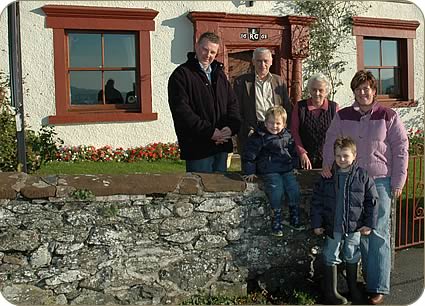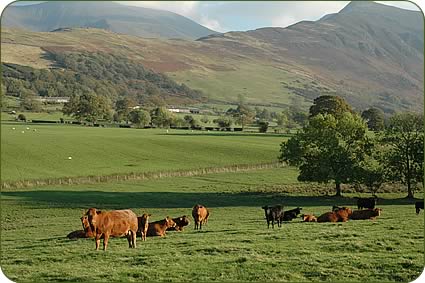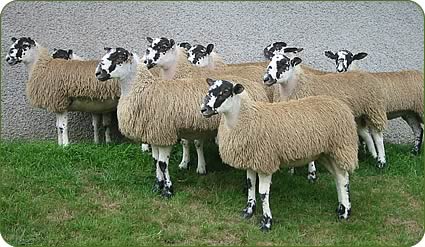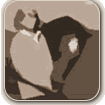Jennifer MacKenzie is an agricultural photo journalist with almost 30 year's experience. Operating from her base in Cumbria, Jennifer undertakes mainly industry-related freelance writing and photography.
Keeping an eye on Bassenthwaite
Prospective visitors can check out the view at Highside Farm, where Deborah and Martyn Mawson have capitalised on the beautiful situation of their beef and sheep farm overlooking Bassenthwaite Lake and established a successful bed and breakfast business.
They have installed a webcam on their chimney on the farmhouse at the foot of Skiddaw which can be accessed through their website.
 |
| The Mawsons - Martyn with parents Standish and Alison with Edward, James and their mum Deborah outside Highside Farm. |
Highside Farm has been farmed by the Mawsons since 1963 with Standish and Alison now being joined by son Martyn and Deborah who have sons James, six, and Edward, two.
The farmhouse dates back to 1668 and may in the past have been used as accommodation for drovers.
Martyn and Deborah have capitalised on the building’s traditional features and through tasteful modernisation created three letting bedrooms with guest sitting and dining rooms in a self-contained annex.
They opened for business three years ago and their English Tourist Board four diamond silver award has already attracted visitors from across the UK – and the world.
Deborah is no newcomer to looking after guests, having initially run bed and breakfast in the cottage up the road for eight years before she and Martyn swapped homes with his parents and moved into the farm.
The emphasis at Highside is on luxury accommodation and its country house style and magnificent views across the lake and the valley – as well as the Mawsons’ warm welcome - have attracted visitors who want to enjoy the outdoors.
And with an eye on the future and generating extra income, the Mawsons have obtained planning permission to convert a stone barn on the farm to two holiday cottages.
“The people who come to stay enjoy sight-seeing – including spotting the valley’s ospreys – as well as cycling and walking. Ullock Pike and Skiddaw are just at the back door and we have quite a number of families. We have a room with separate access for those who are less mobile. People also like to stay on a farm,” said Deborah.
Highside has 350 acres of inside land with a further 60 acres rented and freehold rights on the 1,750-acre Bassenthwaite Common.
The suckler herd which generally averages 70 cows has a high proportion of Limousin blood with many females being three quarter bred.
The predominantly winter calving herd runs with two pedigree Limousin bulls, bred by David Hill, of Great Asby, Appleby, and Ian Armstrong, of Lorton.
Winter housing is from the end of October to the first week in May with cows being fed silage and minerals and calves receive a concentrate blend.
All herd replacements are home bred to minimise disease risks and to be more self sufficient. Calves are sold at 10 to 12 months old at Carlisle and Wigton marts.
“We sell most calves from January to March in the hope of picking up on the better trade earlier in the year,” said Martyn.
“We sell at the special March sale in Wigton and in 2005 we picked up a first and second prize in the heifer section and a first in the bullocks and the heifer by Raysonhall Spartacus sold for £950.”
Martyn Mawson sets out to breed the best calves he can and those with show potential are a bonus, however the Spartacus heifer in the hands of showman William Timms, of Goole, was fifth in its class of 35 at this year’s Great Yorkshire Show.
The farm’s inside land runs from near the lake side up to 900ft at the fell wall and the sheep graze at up to 3,052ft at the top of Skiddaw.
 |
| Cows and calves grazing at the foot of Skiddaw. |
Sheep numbers have been reduced in recent years as part of the Lake District ESA scheme and more recently English Nature’s Sheep Enhancement Scheme on the common.
Of the 550 ewe Swaledale flock, 200 are bred pure and the remainder are crossed with home-bred Bluefaced Leicesters from the farm’s 20 ewes. Semen is taken from the pure bred Leicester flock’s stock ram as an insurance.
To help the farm’s cash-flow, a proportion of the North of England Mule ewes are now retained. A flock of 200 Mules and Texel crosses plus 180 hoggs produce an earlier prime lamb crop from July through to January with the Texel cross hoggs being put to the Charollais.
“It was a long time from April when we finished selling the cattle to September when we sold our Mule gimmer lambs and Bluefaced Leicester rams so not only do the commercial ewes help to improve the cash-flow but we are again being self-sufficient,” said Martyn.
A former chairman of the West Cumbria Branch of the North of England Mule Sheep Association, Martyn sells gimmer lambs at Carlisle, Wigton and Cockermouth, where he has won the championship for NEMSA members.
 |
| The Carlisle pen of North of England Mule gimmer lambs which averaged £98 a head. |
Last year’s Cockermouth champion pen sold for £112 with the Wigton champions at £100. While not champion at Carlisle, this pen sold for £98.
A member of the Bluefaced Leicester Sheep Breeders’ Association, Martyn took lamb rams to the Hawes sale for the first time in 2005 and averaged £850 for four, despite being drawn late in the ballot and selling at 7.30pm!
The champion pen at Cockermouth averaged £500 for five while at Carlisle three ram lambs averaged £600, marking a successful season for crossing type rams.
Vice-chairman of Keswick Show, Martyn supports his local events with sheep entries. He is also a Bassenthwaite parish councillor.
To check out the view and the accommodation at Highside Farm log on to www.highside.co.uk

